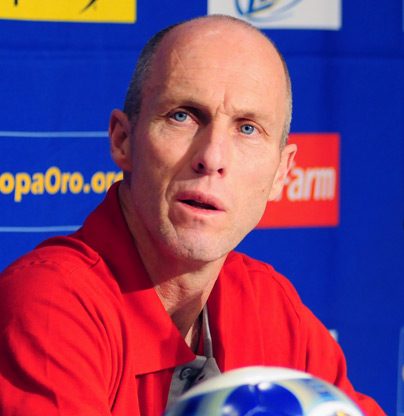Bob Bradley, former Head Coach of the United States Men’s National Team, was named the manager of English Premier League Club Swansea City earlier this week. This shouldn’t be overlooked; it’s the first time an American has led a club in one of Europe’s five major soccer leagues. His move to the Swans is just the most recent managerial switch for Bradley, who has slowly climbed the coaching ranks since his tenure as the USMNT coach ended in the summer of 2011. His journey to the Premier League has not been direct; after leaving the USMNT, Bradley spent two years as manager of the Egyptian Men’s National Team, two years as the head coach of Norwegian club team Staebæk FC, and one season leading second-tier French club Le Havre (bringing them painfully close to promotion).
Bradley was fired from the USMNT after posting a 43-12-25 record as the team’s skipper through 80 games, but his tenure included a lot of notable accomplishments. He led the Americans to a Gold Cup Championship in 2007 and qualified for the 2009 Confederations Cup. The United States finished second in the 2009 Confederations Cup after defeating world number one team Spain in the semifinals, ending the Euro champion’s 15-game winning streak and 35-game unbeaten streak. At the 2010 World Cup, Bradley’s squad won its group but lost in the knockout round to Ghana in extra-time. Finally, in the 2011 Gold Cup, the United States made it to the final and lost to Mexico 4-2 after blowing an early 2-0 lead. Bradley was fired after that game, and some boldly claim he’s the USMNT’s best manager ever.
He was replaced by Jurgen Klinsmann, former manager of Bayern Munich and the German Men’s National Team. Klinsmann’s hire was a splash move expected to invigorate U.S. Soccer with new energy and the “European” style of play. His resume really jumps out at the average soccer fan; he was generally well-known in U.S. circles after starring for the German National Team, Munich, Tottenham Hotspur, and a few other club teams as a player before beginning his managerial career.
Through 80 games, Klinsmann’s record was 44-15-21. He took over in the summer of 2011, won the Gold Cup in 2013, and secured qualification for the World Cup later that year. At the 2014 World Cup in Brazil, the USMNT escaped the notorious “Group of Death” and advanced to the Round of 16, where they lost to Belgium. As early 2015 rolled through, things were looking promising for the United States; they won consecutive friendlies over Mexico, Holland, and Germany. But, their performance in the 2015 Gold Cup was abysmal; the USMNT finished in fourth place and watched from the stands as Mexico easily swept Jamaica aside for the tournament title. Following the disappointing Gold Cup result, the USMNT had an opportunity to reverse its fortune in the fall of 2015: they faced a one game winner-take-all matchup with Mexico for a spot in the 2017 Confederations Cup. The Americans lost that game 4-3.
It’s pretty clear that Bradley and Klinsmann boast nearly identical resumes. They had very similar winning percentages through 80 games, both won a Gold Cup, both advanced to the World Cup knockout round, and both had good and bad runs of form. The ups and downs of managing a country with the mediocre player pool of the United States are to be expected, and both Bradley and Klinsmann went through those experiences.
What I don’t understand is how Bradley’s poor 2011 performance differs from the landscape surrounding Klinsmann in 2015. Both teams exited their respective Gold Cups in disappointing fashions; why was Klinsmann given the U.S. Soccer Federation’s full vote of confidence when Bradley was fired for similar performances? Klinsmann’s dual-role as head coach and technical director could have been a factor, and his constant references to “the process” and focus on a longer-term vision instead of short-term results may have resonated with upper U.S. Soccer management. Even considering that component, Bradley’s U-23 youth squad qualified for the Olympics in 2008… Klinsmann’s 2012 and 2016 teams did not.
Unfortunately, it comes down to one factor: money. Bradley’s contract with U.S. Soccer was not as cumbersome as Klinsmann’s and offered the federation more flexibility in pursuing other options. With Klinsmann’s resume came a pretty heavy contract (and subsequent extension after his early success) which would have strained U.S. Soccer’s financials if they had fired him. It would obviously be more ideal for the decision to be made on performance alone, but business is business, and finances are a huge factor.
At the end of the day, this is all in the past. Klinsmann has rebounded from his poor 2015 and actually has the USMNT playing at a pretty high level right now, thanks to a few new inclusions. Bradley has obviously made the most of his career as a club coach as well, and we’ll be rooting for him as he makes his transition to the Premier League. But, his move is still a reminder of U.S. Soccer’s double standard. Should he have been fired from the USMNT in 2011? Probably. But Klinsmann got a second chance and is making the most of it; what would have happened if Bradley was offered the same luxury? We’ll never know.




